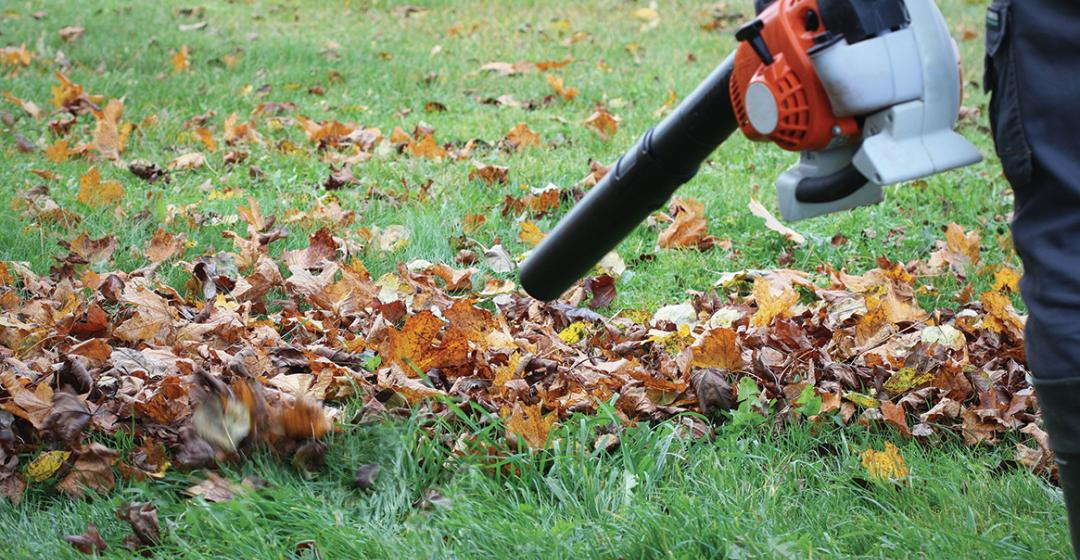The predictable disruptions of tranquility, harmony, and sanity on Martha’s Vineyard are many. There is that August traffic, that snarl at the post office, making ferry reservations. None of these, however – and none of your other nagging irritants – compares to leaf blowers, the day-in, day-out at all hours of the day roaring and screeching fiendish machines cleaning up after nature.
Most Islanders have a favorite seasonal Island soundtrack. For me, in autumn hunting season, I enjoy listening to the distant sound of the surf or the cry of a red-tailed hawk soaring overhead, and I anticipate the sound of a twig snapping under the foot of an approaching deer. I do, that is, unless every natural sound is drowned out by the drone of a high-rpm, screaming two-cycle engine pushing out a jet of air at approximately 200 miles per hour while strapped to the back of a human herding leaves.
I have no gripe with landscapers. They work hard. A leaf blower is a tool that makes the job of corralling leaves quicker and easier. I just wish it weren’t so maddening.
“Characteristics of Lawn and Garden Equipment Sound: A Community Pilot Study,” published in the Journal of Environmental and Toxicological Studies in November 2017, sheds some light on the root of the problem.
The article said, “Most commercial-grade gas-powered leaf blowers (GLB) used in the United States are powered with inefficient two-stroke engines, housed in lightweight metal that offers little sound insulation, and run at three times the speed of an automobile engine (9,000 rpm) producing a loud, monotonous sound. Many people have described the sound as intolerable.”
The study said that the sound pressure levels at fifty feet, typically between sixty-five and eighty decibels, are upwards of fifteen decibels higher than healthy daytime standards set by the World Health Organization. There is more to it.
Researchers found that the sound emitted from gas leaf blowers has low frequency and tonal components, and “the ability of low-frequency sound to travel long distances and penetrate building walls may explain the intolerability of this sound source to people in the community.”
Add to that intolerability this – a general decline in the sanctity of Sunday morning peace and quiet. I heard about a man in Edgartown who began his leaf blowing at 7 a.m., driving his poor neighbor batty.
Amid this decline in neighborly consideration and hand raking, some communities have limited the hours when gas leaf blowers may be used. Others have banned them outright. And it is not just the noise that is fueling action.
The California Air Resources Board, which is charged with reducing air pollution and fighting climate change, said one hour of operation for the best-selling commercial leaf blower “emits smog-forming pollution comparable to driving a 2016 Toyota Camry about 1,100 miles, or approximately the distance from Los Angeles to Denver.”
Noise and air pollution led nineteen California communities, including Carmel and Malibu, to ban gas leaf blowers. Another fifty-nine communities restrict their use. Closer to home, in April, Burlington, Vermont, approved a set of phased-in restrictions that will ban gas leaf blowers by May 2022.
And in Washington, D.C., a city known for hot air and not much action, a ban on gas-powered leaf blowers goes into effect on January 1, 2022.
In an essay in The Atlantic, “Get Off My Lawn,” about the successful D.C. effort by a group of community activists, of which he was a part, writer James Fallows highlights a phenomenon we see on the Vineyard. He says the use of gas-powered leaf blowers in his neighborhood “evolved from a few hours a week during the leafiest stretch of autumn to most days of the week, most weeks of the year, thanks to the advent of the ‘groomed’ look that modern lawn crews are expected to achieve.”
The notion that a lawn should resemble an outdoor carpet, free of any debris, has arrived on the Vineyard. Climate change has only exacerbated the problem. No snow means landscape crews work year-round primping expansive lawns.
On the plus side, leaf blowing is part of a sustainable Island economy. Trees will continue to produce leaves as sure as a Labrador sheds fur. And an influx of new homeowners determined to keep leaves and twigs at bay will provide plenty of work.
One Island company recognizes an opportunity in quieter, green equipment. The Fullers Company of Oak Bluffs, a full-service property management company, claims to be “definitely the first on the Island” to use “fully electric AND solar-powered landscaping equipment.”
Owner Jesse Fuller says that while he still has to fall back on gas-powered equipment when leaves are wet, it’s only “a matter of time” before the best electric equipment is equal in power to gas. As my wife will attest, I can live with leaves and twigs littering our lawn. Why interfere with nature’s palette or spend energy raking that would be better used fishing or hunting?
One afternoon, I sat in a tree stand up-Island on a lovely fall day where for the second day in a row, I was unable to hear anything but the whine of an engine. I chanted: “I hate leaf blowers, I hate leaf blowers.” I was a Buddhist monk in camouflage. The noise stopped.
I heard squirrels rustling in the leaves and birds chirping again.
“Thank you,” I murmured.
Ah, but my reprieve was sadly temporary. The operator refueled and renewed his assault. I resumed my chant: “Om.”





